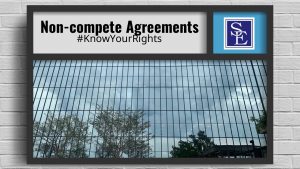New Jersey employees currently restricted by non-competes are often faced with the choice – resign and be prohibited from working in their chosen industry, or stay in a job that isn’t right for them. The industry either loses a valuable, often highly experienced, individual or the employer creates a ‘trapped workforce’, building resentment and losing productivity. If litigation ensues as a result of an employee working for a company in violation of the non-compete agreement, the employee will need a significant amount of money they simply do not have to fight the case. And even if they can afford the high costs of litigation, there is never a guarantee the litigation will result in their ability to take a new job or remain in his or her new employment.
Often the terms of a non-compete can seem confusing and overbroad, leaving employees asking “how can I ever leave for a better job?”. Some non-competes bar the employee from working in the same industry for a long period of time, and/or working for a competitor within a wide geographic area. Those ready to leave their jobs can consult an attorney to find out if these terms are really enforceable.
New Jersey courts analyze the enforcement of a non-compete agreement using three factors, all of which must be met in order for an employer to succeed in enforcement; it must (1) protect the legitimate interests of the employer; (2) not impose an undue hardship on the employee; and (3) not be injurious to the public. The Court’s inquiry into these factors is fact specific to the employee, the employer, the new employer and the relationships amongst each other.
 New Jersey Employment Lawyers Blog
New Jersey Employment Lawyers Blog



